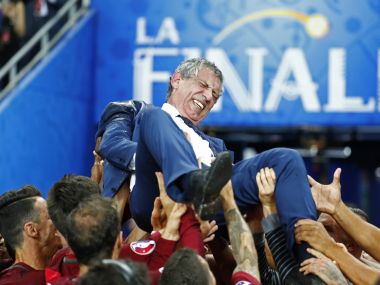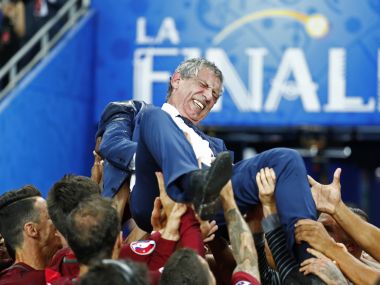By the end of it, Fernando Santos was battling tears. His stern visage could no longer maintain its look. The joy of an unlikely win had overpowered him. Santos was underwhelmed. The narrowest of wins for his team; the widest of smiles for his countrymen and women. It was appropriate that Santos had saved his most expressive reaction for the last. He is known to be a taskmaster and throughout the tournament he ensured that he was able to get the best out of his side. By the end of the final, 21 out of the 23 squad members had spent at least a minute on the pitch. The only ones to miss out were the reserve goalkeepers. [caption id=“attachment_2885934” align=“alignleft” width=“380”]
 Portugal head coach Fernando Santos is lifted up by his players after winning Euro 2016. Reuters[/caption] Some managers may try too many players when they are not certain of what they are achieving. Santos, on the other hand, had a clear idea of what he wanted from his players. Every squad member was in France for a reason, to implement the manager’s vision. Even Cristiano Ronaldo. Admittedly, Portugal did not always play the best football. But how many teams did it meet that were clearly better on the day of the match? It is difficult to argue with conviction that Croatia, Poland, Wales and France outplayed Portugal in any of the knockout encounters. Santos recognised the limits of his side and responded in fine fashion. Over the past few days, there has been a tendency to paint this Portuguese side with the same brush that was used for the 2004 European champion Greece. However, Santos did not field his side to play a dull style of football. It was unadventurous but there were intermittent moments of flair. A conservative manager would not have started 18-year-old livewire Renato Sanches in the final three knockout games of Portugal’s campaign. There was a distinct balance to the side, quarterfinal onwards. Adrien Silva’s hardworking ways were complemented by Joao Mario’s silky movement and tough running in the midfield. Arguably, Santos made his most important interjections in defence, after a 3-3 draw with Hungary that demonstrated his back four was not the smoothly functioning unit he demanded. Right-back Vierinha, whose natural instincts as an attacking wide player undermined the Portuguese backline, was ditched for the more stable Cedric Soares. Pepe, who was arguably Portugal’s player of the tournament, also had a new central defensive partner in Jose Fonte. The 38-year-old Ricardo Carvalho was conspicuously off-pace and was a liability on the left-hand side. Therefore, Santos chose to include the Southampton duo of Fonte and Soares to lend firmness to the defence. William Carvalho, who had come into the side after missing the first match, provided another layer of protection. Santos, of course, had already solved the conundrum of how to play Nani and Ronaldo in the absence of a quality striker. Both of them played in a partnership as forwards with Nani ensuring he could bring his more illustrious compatriot into play more often than not. But even the best of plans can go haywire, as Santos realised in the final. He responded to Ronaldo’s injury-forced early departure by introducing Ricardo Quaresma, who had already made telling contributions from the bench in earlier rounds. Later, Renato Sanches was replaced by a conventional striker in Eder and the decision paid off in extra time. In the absence of Ronaldo, Santos realised he needed a more clinical figure at the top than Nani and Quaresma. He was not wrong. Santos had once said, “As a coach, I do not have a heart.” The 61-year-old’s tendency to make reasoned choices that bear little room for sentiment has marked him out for long. Perhaps, that is a consequence of his love for machines. Santos possesses a degree in electrical and telecommunications engineering and he supplemented his playing career with Estoril by working as the director of technical services at one of the hotels in town. The Lisbon-born coach
kept that job until 1998
, when he quit because FC Porto had come calling for him. However, the previous decade in coaching had been spent managing both jobs. Santos’ love for engineering meant that football could never become the overriding priority. In an interview to Portuguese daily Sol, Santos revealed how difficult it was for him to leave the job at the hotel. “I felt a huge nostalgia for the hotel, something I still have. Sometimes I just wanted to call and see how they were getting on.” A man of simple passions and serious demeanour, Santos is known to demand discipline and hard work from each of his players. One suspects his humble beginnings inform his world view that things do not come easy; they need to be earned with graft and resoluteness. This is one of the reasons why Santos will derive immense pleasure from Portugal’s European Championship win. The national side was a reflection of his coaching and life philosophy. To see his players give form and meaning to values he has held all his life must give Santos deep satisfaction. It is certainly worth crying for.
Portugal head coach Fernando Santos is lifted up by his players after winning Euro 2016. Reuters[/caption] Some managers may try too many players when they are not certain of what they are achieving. Santos, on the other hand, had a clear idea of what he wanted from his players. Every squad member was in France for a reason, to implement the manager’s vision. Even Cristiano Ronaldo. Admittedly, Portugal did not always play the best football. But how many teams did it meet that were clearly better on the day of the match? It is difficult to argue with conviction that Croatia, Poland, Wales and France outplayed Portugal in any of the knockout encounters. Santos recognised the limits of his side and responded in fine fashion. Over the past few days, there has been a tendency to paint this Portuguese side with the same brush that was used for the 2004 European champion Greece. However, Santos did not field his side to play a dull style of football. It was unadventurous but there were intermittent moments of flair. A conservative manager would not have started 18-year-old livewire Renato Sanches in the final three knockout games of Portugal’s campaign. There was a distinct balance to the side, quarterfinal onwards. Adrien Silva’s hardworking ways were complemented by Joao Mario’s silky movement and tough running in the midfield. Arguably, Santos made his most important interjections in defence, after a 3-3 draw with Hungary that demonstrated his back four was not the smoothly functioning unit he demanded. Right-back Vierinha, whose natural instincts as an attacking wide player undermined the Portuguese backline, was ditched for the more stable Cedric Soares. Pepe, who was arguably Portugal’s player of the tournament, also had a new central defensive partner in Jose Fonte. The 38-year-old Ricardo Carvalho was conspicuously off-pace and was a liability on the left-hand side. Therefore, Santos chose to include the Southampton duo of Fonte and Soares to lend firmness to the defence. William Carvalho, who had come into the side after missing the first match, provided another layer of protection. Santos, of course, had already solved the conundrum of how to play Nani and Ronaldo in the absence of a quality striker. Both of them played in a partnership as forwards with Nani ensuring he could bring his more illustrious compatriot into play more often than not. But even the best of plans can go haywire, as Santos realised in the final. He responded to Ronaldo’s injury-forced early departure by introducing Ricardo Quaresma, who had already made telling contributions from the bench in earlier rounds. Later, Renato Sanches was replaced by a conventional striker in Eder and the decision paid off in extra time. In the absence of Ronaldo, Santos realised he needed a more clinical figure at the top than Nani and Quaresma. He was not wrong. Santos had once said, “As a coach, I do not have a heart.” The 61-year-old’s tendency to make reasoned choices that bear little room for sentiment has marked him out for long. Perhaps, that is a consequence of his love for machines. Santos possesses a degree in electrical and telecommunications engineering and he supplemented his playing career with Estoril by working as the director of technical services at one of the hotels in town. The Lisbon-born coach
kept that job until 1998
, when he quit because FC Porto had come calling for him. However, the previous decade in coaching had been spent managing both jobs. Santos’ love for engineering meant that football could never become the overriding priority. In an interview to Portuguese daily Sol, Santos revealed how difficult it was for him to leave the job at the hotel. “I felt a huge nostalgia for the hotel, something I still have. Sometimes I just wanted to call and see how they were getting on.” A man of simple passions and serious demeanour, Santos is known to demand discipline and hard work from each of his players. One suspects his humble beginnings inform his world view that things do not come easy; they need to be earned with graft and resoluteness. This is one of the reasons why Santos will derive immense pleasure from Portugal’s European Championship win. The national side was a reflection of his coaching and life philosophy. To see his players give form and meaning to values he has held all his life must give Santos deep satisfaction. It is certainly worth crying for.
Euro 2016: Portugal’s win is testament to coach Fernando Santos’ machine-like drive
Priyansh
• July 11, 2016, 08:57:20 IST
Euro 2016 winning Portugal was a reflection of coach Fernando Santons’ coaching and life philosophy.
Advertisement
)
End of Article